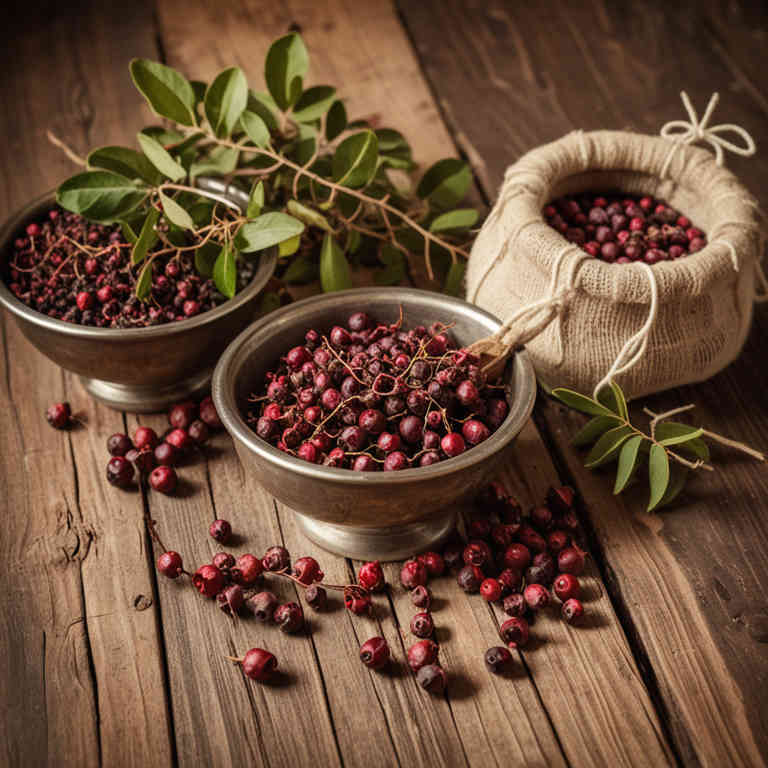Vaccinium myrtillus decoction for medicinal use

Vaccinium myrtillus decoction is a preparation made by boiling the dried leaves and berries of the common bilberry plant.
This herbal remedy has been traditionally used in European herbalism for its potential health benefits. It is often consumed to support vision health, particularly in conditions like night blindness. The decoction may also aid in improving circulation and reducing inflammation.
It is typically used as a tonic or in formulations aimed at supporting eye and circulatory health.
Uses
Vaccinium myrtillus decoction has been used to treat various ailments across different cultures and time periods.
Historically, it was valued by indigenous peoples of Europe and North America for its purported healing properties, often used to address digestive issues and respiratory conditions. In traditional medicine, it was also employed to reduce inflammation and support skin health. Modern research suggests that the decoction may contain antioxidants and anti-inflammatory compounds, leading to its use in contemporary herbal remedies for immune support and digestive wellness.
However, further scientific studies are needed to fully validate its efficacy and safety in modern medical contexts.
Benefits
Vaccinium myrtillus decoction has health benefits such as supporting digestive health, reducing inflammation, and boosting the immune system.
This herbal preparation, derived from the blueberry plant, is rich in antioxidants and polyphenols that help neutralize free radicals in the body. It may also aid in improving cardiovascular health by lowering blood pressure and cholesterol levels. Additionally, it has been traditionally used to support urinary tract health and alleviate symptoms of urinary tract infections.
Its anti-inflammatory properties may contribute to overall wellness and help manage chronic conditions.
Constituents
Vaccinium myrtillus decoction active constituents include anthocyanins, proanthocyanidins, flavonoids, tannins, and organic acids.
These compounds contribute to the decoction's antioxidant, anti-inflammatory, and antimicrobial properties. Anthocyanins and proanthocyanidins are particularly noted for their ability to support cardiovascular health and improve circulation. The tannins in the decoction may aid in digestive health by reducing inflammation in the gastrointestinal tract.
Overall, these active constituents make Vaccinium myrtillus decoction a valuable herbal preparation for promoting general wellness and supporting various bodily functions.
Preparation
To make Vaccinium myrtillus decoction, begin by gathering fresh or dried blueberries, ensuring they are clean and free from contaminants.
Next, place the blueberries in a pot and add water, using a ratio of approximately 1 part blueberries to 2 parts water. Bring the mixture to a boil, then reduce the heat and let it simmer for about 15 to 20 minutes to extract the active compounds. Strain the liquid through a fine mesh strainer or cheesecloth to remove the plant material, and allow the decoction to cool before use.
This preparation is often used in traditional medicine for its potential antioxidant and anti-inflammatory properties.
Side Effects
Vaccinium myrtillus decoction may lead to gastrointestinal discomfort, such as nausea, vomiting, and diarrhea, due to its high acidity and active compounds.
It can also cause allergic reactions in individuals sensitive to the plant, manifesting as skin rashes, itching, or more severe anaphylactic responses. Prolonged use may lead to liver toxicity, as some studies suggest potential hepatotoxic effects from the compounds present. Additionally, it may interact with certain medications, particularly those affecting the liver or blood sugar levels.
It is important to consult a healthcare professional before using this preparation, especially for individuals with pre-existing medical conditions.